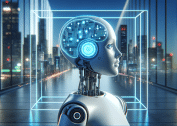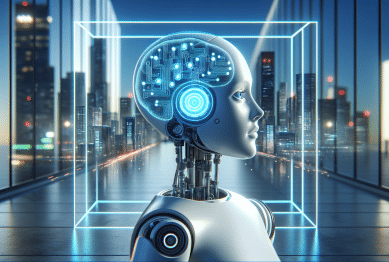Artificial intelligence is rapidly transforming how people live, work, and interact with technology. This guide explores the many practical ways AI appears in daily routines, enhancing convenience and offering new opportunities while raising questions about data, privacy, and future possibilities.
Understanding Artificial Intelligence in Daily Routines
Artificial intelligence, often shortened to AI, is more than just a buzzword in tech circles. It refers to computer systems designed to perform tasks that normally require human intelligence, like problem-solving or recognizing patterns. AI is present in countless everyday interactions, powering applications people might not even realize are driven by advanced technology. From voice-activated assistants in smartphones to targeted recommendations while browsing online retailers, AI algorithms work behind the scenes to deliver convenience, efficiency, and personalization.
Several sectors now incorporate AI as a core component of their services. For example, when a user enters a search query, AI technologies analyze preferences and provide the most relevant results. social media feeds use complex machine learning models to prioritize content, ensuring users see updates and articles tailored to interests. Navigation apps harness real-time data and AI-driven analytics to provide optimal routes, helping individuals avoid traffic and save time on commutes.
As AI advances, its presence in daily life is expanding. Smart home devices can learn routines, adjusting lighting and temperature for comfort or security. Photo recognition tools classify images automatically, making the management and retrieval of digital memories straightforward. These everyday encounters show that artificial intelligence is already integral, influencing how tasks are completed and information is accessed, often without conscious effort from users.
The Role of AI in Personalized Experiences
Customization is one of the standout contributions of artificial intelligence. Entertainment platforms like music and video streaming services deploy AI-driven recommendation engines to suggest shows, songs, and movies based on individual viewing patterns. This process improves satisfaction and keeps users engaged. E-commerce sites use similar models to surface products that align with previous purchases or browsing history. The concept is simple: the more relevant the content, the better the experience for the user.
AI personalizes more than just online media. In healthcare, virtual assistants and chatbots can guide patients to appropriate resources based on reported symptoms or medical history, enhancing accessibility and care continuity. Educational applications leverage artificial intelligence to adapt exercises and feedback to the learner’s skills and progress. By identifying patterns in how someone learns or struggles, the system can present tailored support, increasing the chances for better outcomes.
These targeted experiences depend on the sophisticated analysis of large data sets. The more AI systems learn about preferences, habits, and behaviors, the more accurate and meaningful their recommendations become. While this level of convenience is admired by many, it also encourages discussion about the ethical use of personal data, privacy controls, and user consent, highlighting the need for responsible implementation as AI continues to evolve.
Artificial Intelligence and Smart Home Technology
Smart home technology showcases artificial intelligence in action. Devices like smart thermostats, lighting systems, and security cameras use AI-powered sensors and analytics to adapt to the unique needs of a household. For example, a smart thermostat can learn daily routines, adjusting temperatures automatically based on occupancy and weather forecasts. These applications promote energy efficiency, comfort, and even safety, making homes more responsive to their inhabitants’ needs.
Voice assistants have become a staple in connected homes. By processing natural language, AI enables devices to respond to commands, answer questions, and control home systems seamlessly. The ability to create routines—such as dimming lights when a movie starts or locking doors at night—adds to the convenience and security of modern living. The technology is getting better at understanding context, subtle speech nuances, and even multiple languages, ensuring inclusivity and adaptability for diverse users.
AI doesn’t just serve convenience; it can enhance safety and accessibility. Smart security cameras, for instance, identify potential threats through real-time image analysis and send alerts only when needed, reducing false alarms. Seniors and individuals with disabilities benefit from AI-powered alerts, medication reminders, and emergency call features. As these tools become more widespread, they demonstrate how artificial intelligence contributions can extend well beyond novelty, supporting autonomy and peace of mind.
Data Privacy and Ethical Considerations in AI
As artificial intelligence becomes more deeply integrated into everyday life, significant questions about data privacy and ethical use emerge. AI relies heavily on the collection and analysis of large amounts of personal data to function effectively. This includes information about user habits, locations, interests, digital communications, and sometimes even biometric identifiers. While this data makes AI smarter, it also raises concerns about how such information is collected, stored, protected, and potentially shared without explicit consent.
Several incidents have highlighted the potential for misuse of personal data by AI-powered systems. The challenge is finding a balance between the compelling convenience artificial intelligence offers and the fundamental rights to privacy and informed consent. Policymakers, researchers, and technology companies are working collaboratively to establish data protection frameworks, transparency guidelines, and algorithmic accountability. These safeguards help ensure that user data handled by AI is done ethically, with established oversight mechanisms in place.
Awareness among consumers is key. By understanding the trade-offs between personalization and privacy, individuals can make more informed decisions about how and when they share data with AI-driven platforms. Exploring consent dashboards, reviewing permissions, and staying updated on privacy policies empowers people to retain some control while enjoying the evolving capabilities of artificial intelligence. Many experts agree that an open conversation about data ethics is essential as AI continues to grow in scope and influence.
Opportunities for Learning and Growing with AI Tools
Artificial intelligence tools are rapidly changing how people approach learning and skill-building. Anyone with internet access can discover interactive online courses or adaptive learning apps powered by machine learning algorithms. These educational resources—offered by universities, nonprofits, and private organizations—can personalize lessons, assess strengths, and offer tailored feedback to help individuals make measurable progress at their own pace.
AI fosters curiosity by making complex topics more accessible. In science classrooms, virtual labs powered by artificial intelligence allow learners to experiment in safe environments, bridging the gap between theory and practice. AI chatbots provide instant homework support, answering math problems or explaining difficult concepts on demand. These digital tools aren’t just about information—they encourage self-driven exploration and can even identify early struggles before they hinder academic progress, making intervention timely and more effective.
Collaboration between humans and AI is a growing trend. Many professionals use artificial intelligence to boost productivity, research, and creativity. Scientists use AI for data analysis to uncover trends that would otherwise go unnoticed. Artists experiment with AI-generated music and visual art, blending technology and imagination. By exploring what AI platforms offer, individuals are empowered to tackle new challenges, stay informed on technological advances, and become active participants in a rapidly evolving digital landscape.
Looking Ahead: The Expanding Impact of Artificial Intelligence
Innovation in AI is accelerating, promising both exciting possibilities and ongoing debates. Some of the most significant breakthroughs on the horizon include advancements in natural language processing, robotics, and predictive analytics, which are expected to further revolutionize industries from healthcare and education to logistics and climate science. New forms of AI could support personalized medicine, faster research, or sustainable energy solutions, highlighting the importance of responsible and inclusive development.
The workforce is also evolving in response to AI’s growth. Automation transforms repetitive tasks, allowing people to focus on problem-solving and creative pursuits that play to human strengths. While some fear displacement, many experts suggest that skill-building and lifelong learning are crucial for harnessing opportunities and adapting to the changing demands of the job market. By fostering digital literacy, workers from all backgrounds can take part in shaping an AI-enhanced future.
Ultimately, the story of artificial intelligence is a human one. The decisions made today about ethics, transparency, and empowerment will shape how technology is integrated tomorrow. Ongoing dialogue among policymakers, businesses, academics, and everyday people is essential to ensure that AI brings benefits to most, rather than a select few. Curiosity, adaptability, and a proactive approach to understanding AI will remain vital as the digital world evolves.
References
1. European Commission. (n.d.). Artificial Intelligence. Retrieved from https://digital-strategy.ec.europa.eu/en/policies/artificial-intelligence
2. MIT News. (n.d.). How AI is Changing the World of Work. Retrieved from https://news.mit.edu/2022/artificial-intelligence-transforming-work-0511
3. Stanford University. (n.d.). Artificial Intelligence Index Report. Retrieved from https://aiindex.stanford.edu/report/
4. Pew Research Center. (n.d.). AI and Human Enhancement. Retrieved from https://www.pewresearch.org/internet/2021/06/24/experts-say-the-rise-of-ai-will-make-most-people-better-off/
5. U.S. Department of Energy, Office of Science. (n.d.). Artificial Intelligence and Machine Learning. Retrieved from https://science.osti.gov/Initiatives/Artificial-Intelligence
6. Harvard University. (n.d.). Understanding AI and Ethics. Retrieved from https://cyber.harvard.edu/story/2022-08/understanding-ai-ethics









